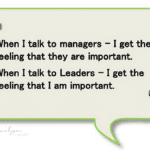There seems to be a growing trend around me of people calling others out in public forums. I’m not sure why…
Here’s an example: John and Mary are in a meeting (with a bunch of co-workers). In front of everyone, John says to Mary, “Hey Mary. You’re going to buy some chocolate bars for my son’s band, aren’t you?” or John says, “Mary…I haven’t received an article for the company newsletter from you. Can you send me one?”
Frankly, I think of this as calling someone out. It’s intentionally putting the other person in a position where they are being embarrassed into participating. Let’s face it . . it’s bullying and there’s no excuse for it.
Now, let’s say it’s part of Mary’s job to buy chocolate bars and/or write articles for the company newsletter. Then, John’s comments are merely holding Mary accountable. That’s different but it should still be done in private. It can still come across as being rude.
Same goes for situations where it’s not a part of Mary’s job but she says she’s going buy candy or write an article. Again, John’s simply holding her to her word.

And, if the other person says (either publicly or privately) “nope, not buying those candy bars” or “sorry, I’m too busy to write that article”, then you need to respect the response. I’ve actually seen situations where someone declines and the person keeps bullying them. Consider how such repeated requests look to your colleagues. Are you coming across as self-centered because you can’t take no for an answer or desperate because you aren’t moving on?
Some people might say that calling another person out is all a part of some grand office politics strategy. It’s not. It’s bullying so just stop it. But if you really feel compelled to call someone out in a public forum, make sure it’s for something really important. Otherwise the person on the receiving end might just call you out for it.
Image courtesy of jerine.
2







Trish McFarlane says
Hi Sharlyn- I don’t know if my examples are calling people out in the same sense, but there are two that came to mind as I read your post. The first is when you’re not asked directly, but the “boss” wants you to buy something from their child (candy, wrapping paper, whatever). Definitely feel obligated for fear of being called out. The fear can be almost as bad.
And my pet peeve of being “called out” by my kids teachers. As a working parent, I feel like every time I get a memo from the school about helping out for this or that during the middle of the workday, I’m being called out for not being a good parent. The school definitely bullys us into doing things and volunteering when it could put jobs at risk.
Good post on a topic I think we can all relate to. Everyone gets called out at one time or another.
hr bartender says
Trish – the boss situation is another excellent example of calling people out. The fact that they’re the boss only accentuates things and adds the fear component you described.
And you brought up a good point regarding non-profits and/or the volunteer world. How many organizations call people out for donations, sponsorships, attendance at functions, etc.? Something they should consider, especially during these challenging economic times. Not everyone has the same resources.
Thanks for adding to the conversation!
Jennifer V. Miller says
Sharlyn,
What an astute observation about human dynamics! In situations like this, I find that the “caller” believes that by applying a bit of peer pressure, he/she will increase the likelihood of getting what he/she wants. True, in the short-term, the goal will be achieved (candy bars sold) but the trade-off is resentment, embarrassment and possibly lost trust from the “callee”.
And yes, it *is* a form of bullying, although I suspect the people doing the calling out would be shocked and offended by being calling bullies.
Another excellent post, Sharlyn. Glad I stopped by this morning!
Kate Nasser, The People-Skills Coach says
From Kate Nasser, The People-Skills Coach
Your post does bring to light very bad people-skills (aka soft skills). The stories you relate have an element of pressure/bullying that more often than not breeds resentment and *bad changes in behavior in future interactions.
Your example: “Hey Mary. You’re going to buy some chocolate bars for my son’s band, aren’t you?” This is not a question. It is a “command” made to sound like a question. To show respect and attention to the value of team interaction, John needs to say something like: My kid is selling chocolate bars for his band. If anyone wants to support this cause, just let me know.
In the case of worked that is “owed” and not delivered, there are so many (better) ways to review status of outstanding projects and due dates that don’t sound like a public threat.
This post brings to light a situation that does occur in many team settings. Leaders would do well to put the subject on the table in a team meeting for all to discuss effective ways to communicate and to highlight the damaging effects to future interactions of “calling out”.
Thanks for posting this!
Kate
Karla Porter says
These are classic reasons many companies adopt a no solicitation policy. Some employees may not like it and others will appreciate it very much. As Kate pointed out, not everyone has well developed soft skills to understand appropriate boundaries. Thanks for bringing up the topic Sharlyn!
P.S. This is a perfect topic for new hire orientation =)
April HR says
Great article. I would guess some people would view this as a successful tactic for getting what they want. I think it is wonderful that you are calling it like it is.
Frank Zupan says
Interesting topic. I know that the “candy bar” scenario is addressed by many companies with the adoption of a non-solicitation policy, which limits employee fundraising activities. The added benefit of these policies is that they can typically stifle union organization ;<)
With respect to day-to-day business scenarios, I like Kate's suggestion for leaders/managers to have an open (and hopefully ongoing) dialogue about acceptable team communications. This allows individuals to acknowledge and accept that different methods of communication are acceptable within a team environment and that none (again, hopefully) are designed or delivered to intimidate or "bully". One of the first signs of trouble is when a leader/manager tells me "I don't need to have this type of discussion with my team".
Frank
hr bartender says
@Jennifer – You’re right…it’s sad but true that the caller does get what they want in the short-term. Thanks for stopping by!
@Kate – Thanks for offering some suggestions to deal with this kind of behavior.
@Karla – Good point about no solicitation policies. Organizations have those policies for a reason…it’s a shame when they aren’t respected.
@April – Thanks for the comment. I agree that getting what you want but leaving ‘body bags’ along the way isn’t being successful.
@Frank – Spot on. It’s a red flag when managers don’t feel the need to communicate with their team.
Kate Nasser, The People-Skills Coach says
Karla makes a great point — wonderful topic for new hire orientation. Often new hires learn the “culture” of a team by watching. If a leader is just starting to address the issues as I suggested, it will take time to work. To have it made clear in new hire orientation reinforces the more effective communication methods.
Frank — I agree with you that a leader who thinks they don’t need to have discussions on this topic is in trouble.
Kate
Alicia Arenas (@AliciaSanera) says
Sharlyn, since I’m no longer in the traditional brick and mortar business world, the first thing that came to my mind was social media bullying. There are no written etiquette rules and there is not a policy. But the principles we use when we communicate with people face to face should also apply online.
For example, earlier this year, Michael Long and I were called out by a job seeker in NY, wanting to relocate to San Antonio. We both spoke with him and helped him as much as we could. After four weeks (yes, 4 weeks) he had not found a job and called us out, especially Michael on Twitter. Michael handled it beautifully and tried to engage the person in a conversation which the job-seeker refused to do.
We can’t control whether or not people call us out online, but we can always be mindful of our response.
Thanks for the great post!
hr bartender says
Alicia – you’re so right. The same principle applies to online communications, maybe even more so…because we don’t have the benefit of voice inflexion, body language, etc. Thanks for the comment!
Steve Levy says
It’s interesting that the “bully” is portrayed in this story as a man and the “target” as a woman…
Just as people vary in their skills and abilities, so do organizations and frankly, you can only do so much to change either of them – is it John or is it the tenor of the organization speaking through John? Any orientation/onboarding program I’ve ever developed discussed harassment in the workplace – call it bullying if you choose but it falls under the dominion of harassment – but subtle harassment is as gray as gray can be just as what is ethical in recruiting has an enormous gray area. You can pontificate that “leaders should foster [blah blah blah]” but with open communication comes more shades of gray like one person’s perception of rudeness. Boy (oops, should I say “girl”), human resources is so complicated!
Here’s one option: Ban chocolate bars and Girl Scout cookies from a company, implement a zero-tolerance policy. Also take down that Facebook page employment branding tool that touts individuality at your company because you know how the blending of individuals can often become toxic and explosive. Better stop supporting community organizations under the company’s banner too. Why not become that school that sends your cute little kindergarten kid home because they brought a water pistol in for show and tell?
Easy does it folks, I haven’t forgotten the original message that John called Mary out and the HR Bartender has a problem with it: Sure he made a public statement but Sharlyn also neglected to write if he said it with malice, humor, smiling, frowning, etc. Is it rude to hold people accountable? Have you ever been to a sales meeting where reps openly talk about their revenue commitments? Do Mary and her co-workers possess Jello for a spine? Are they automatons who can’t fend even a little bit for themselves? Can’t we all just get along?
Look, I’m just feigning anger but society IS becoming more “direct” and in-your-face. Some of this behavior is good, some bad, some downright hilarious. But we have to adapt and roll with some of it and hopefully find a better place to travel. My elderly Mom is probably going to die unhappy because her life didn’t turn into the complete fairly tale woven by her Dad when she was a little girl; she stuck to a rigid belief in what things should be and has missed out on some great opportunities to travel down new paths. She has remained so tied and committed to one structure her entire life and while it pains me to see her in such a state, it was her choice. Some teams work well beating the heck out of each other while others prefer to give each other gifts and burn scented candles. Which one is better for the organization?
It’s the same with workplace harassment; certain behaviors are legal, illegal or gray…and most are gray because when you bring people together, SOMEONE is gonna be out of sorts for someone else’s behavior. Are you going to legislate gray or simply offer guidelines and let the organization decide which behavior is to be fostered? Are you going to mandate the behaviors of a leader or are you going to create a framework where different kinds of leaders emerge. People talk about tough love with troubled kids but bristle at “tough love” in the workplace/ Does HR really need to be the nun with the ruler looking for knuckles to smack?
Kate Nasser, The People-Skills Coach says
Simply put Steve, it’s not what a person says it’s how s/he says it. I chuckled as I read your rude way of writing your comment while you claim you don’t know what rudeness is. You claim that society is becoming more direct and “in your face”. These are not the same thing.
Direct w/diplomacy is not the same as rude/in your face. I teach honesty that doesn’t leave “body bags”.
People choose how to communicate and bear the consequences of those choices. However, when those choices impact an entire team’s performance and thus the success of the company, the leadership has every right to create (hopefully in advance) communication culture that breeds positive teamwork — not scars that toughen everyone up so they can live in your (seemingly preferred) in-your-face society. Rude people are not only choosing to communicate rudely, many are bullying others and it is unacceptable.
Most importantly, in-your-face people do not get to set the culture of a company. The company gets to set the culture and there are some companies/certain industries where what you describe is very normal. There are many more where it is not acceptable.
In any case, I get to work with the multitudes of people who have the capacity for learning that empathy and honesty are not mutually exclusive. It’s not what you say, it’s how you say it that matters. You can read more of my blog posts at http://katenasser.com/articles.
Kate
Kate Nasser, The People-Skills Coach says
Words can woo or wound. Create bonds not scars. ~Kate Nasser
Steve Levy says
Kate,
Kumbayah
Tammy Colson says
I’ve seen more than my share of this “calling out” – where someone uses a very public method to communicate a private matter.
We use twitter and blogs and facebook in the way we used to use chat and email – and many times, this is simply an inappropriate venue.
Just as in the office, when what would ostensibly be a private conversation is tossed out in the middle of a meeting with people who simply DO NOT NEED TO KNOW.
Call it bullying, or harassment, or whatever – I call it “using the appropriate method of communication for the topic at hand”
No need to use a loaded word. Its a lack of communication skills.
And the idea of using a public forum to coerce compliance from an individual just makes me ill. Grow up.
Lance Haun says
Are you calling me out Sharlyn? I kid, I kid.
Also, Steve’s comment kills me just a little bit. I think everyone gets the fact that teams work in different ways and that in the right context, the conversation would have been funny. At the same time, people that complain about conformity are often times complaining about the fact that they can’t be assholes anymore. That being professional when a situation is in doubt (as in they’re not 100% sure that the joke or jab is going to be taken the way they intend) is stomping on individuality.
To me, having someone that always feels the need to push the boundaries of workplace appropriateness is just as annoying as the person who wants to make everything vanilla and PC in an organization. Neither one realizes that there is a cause and effect to their actions and neither one is ever going to be happy unless they go to a place that is just as vanilla (or unbounded) as they are.
hr bartender says
Thanks to everyone for keeping the conversation going…I think the dialogue is interesting.
My thought is this really comes down to respect. It’s fine to ask people for stuff (buying cookies, whatever)…how you handle it is driven by how much respect you have for the other individual. If you don’t care about your working relationship with them…then it doesn’t really matter how you ask them.
Same goes for accountability. There are many ways to hold people accountable. How you handle it will determine the result.
I hope for all of our sakes that respect isn’t leaving the workplace. But if leadership sees working relationships eroding, they need to find out why. And, they need to address it.
Alicia Arenas (@AliciaSanera) says
I think you make *some* valid point Steve. It is always easier to legislate (or create policies) to address potential inappropriate behavior. What is harder is creating an environment in which leadership is held accountable for their actions and employees are empowered to say “no.”
Kate – I like your distinction between direct and in-your-face.
Kate Nasser, The People-Skills Coach says
Thanks Alicia. I have learned that it is an important distinction to make because many misinterpret diplomacy to be the extreme “PC”. For those who experience this confusion a few examples that distinguish direct from rude/in-your-face can go a long way to resolve potential conflicts without leaving scars.
I agree w/Sharlyn that respect is the underlying element. If your goal is to respect others while communicating your thoughts/needs — it will come out better.
Lance – Bravo on your insight that people who claim about conformity are complaining that they simply cannot say whatever comes into their minds without thought of impact on others.
Sharlyn – You sure hit a great note with this post!
I wish everyone who has visited here a truly wonderful “new” year filled with great insights and continuous learning about people-skills.
Warmest wishes,
Kate
Kate Nasser, The People-Skills Coach says
Hi Sharlyn,
Here’s a post I just found on Effective Workplace Communication and the Circle of Assumptions … http://bit.ly/6qHWdz
This article shows how valuable honesty said with respect can deliver great results in meetings and for teamwork.
Hope it’s OK with you to post this here for all to read. If not just let me know for future.
All the best,
Kate
Jennifer V. Miller says
Kate,
The Circle of Assumptions reminds me of Peter Senge’s “Ladder of Inference” from the 5th Discipline Fieldbook (Peter Senge et al, 1994). I still refer to that book from time to time. An excellent resource for those of us in Organizational Development.
hr bartender says
@Kate – absolutely, you’re welcome to post. That’s what community is all about…everyone sharing their resources and experience. Thanks for the link!
@Jennifer – thanks for reminding me I should dust off “The 5th Discipline”…
Russ says
Now the larger question: Should this type of behavior continue, and regardless of the sex or gender of the person “calling out,” could this be considered “creation of a hostile work environment?”
hr bartender says
Thanks for the question Russ. I guess I should start my comment out by saying I’m not an attorney…yada, yada, yada….
That being said, I’d like to think that organizations define the expectations of behavior in the workplace. And when employees are not meeting those expectations, they are being coached. I think there is a wide spectrum of performance issues/mitigations before reaching hostile work environment.
Kate Nasser, The People-Skills Coach says
Here’s a very valuable post on GEN Y skills for success by Terrence Wong. I think the advice is spot on for every generation and person in the work force. This post doesn’t complain about the differences in generations. It offers clear steps to success. Hope you enjoy: http://bit.ly/57UHvo